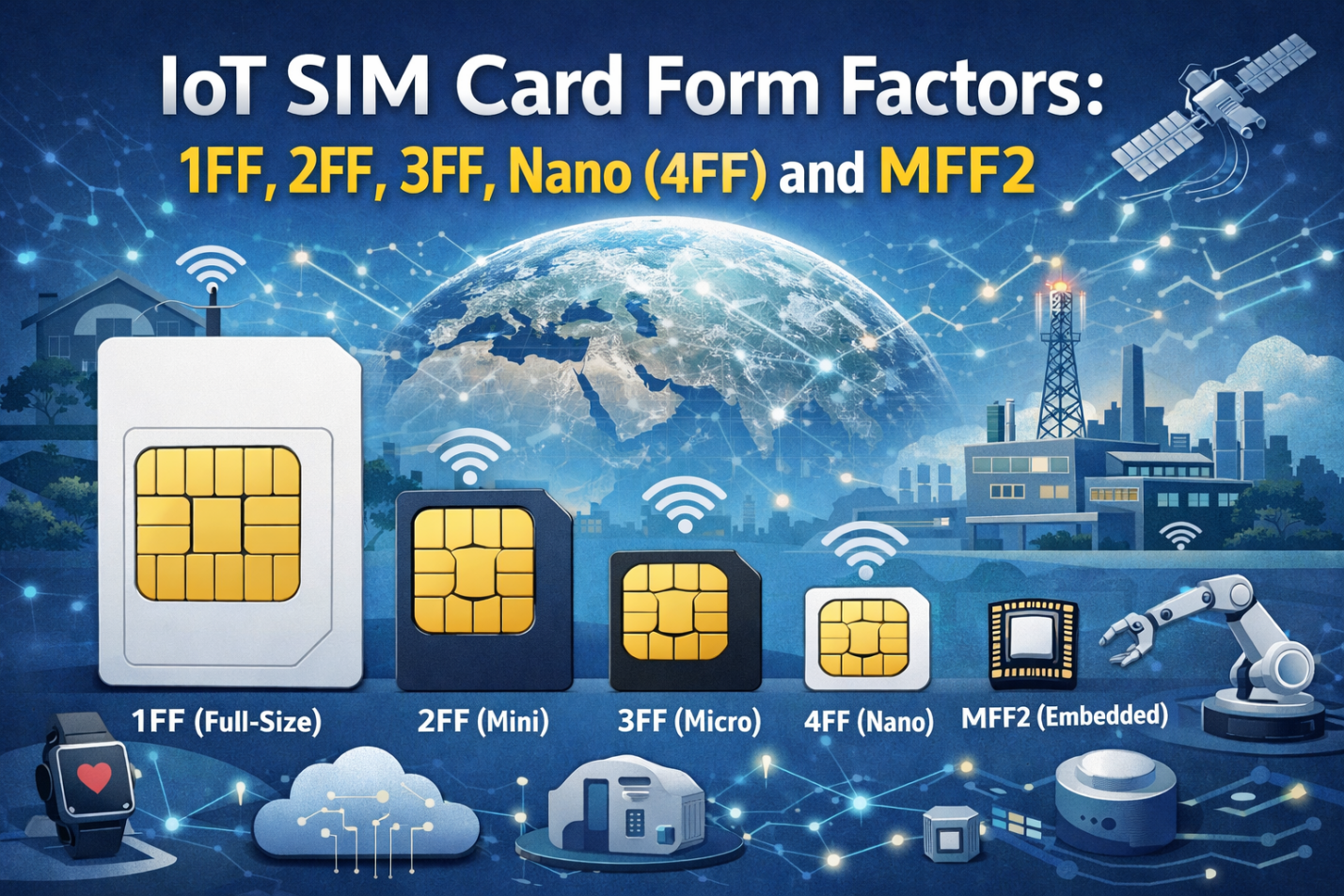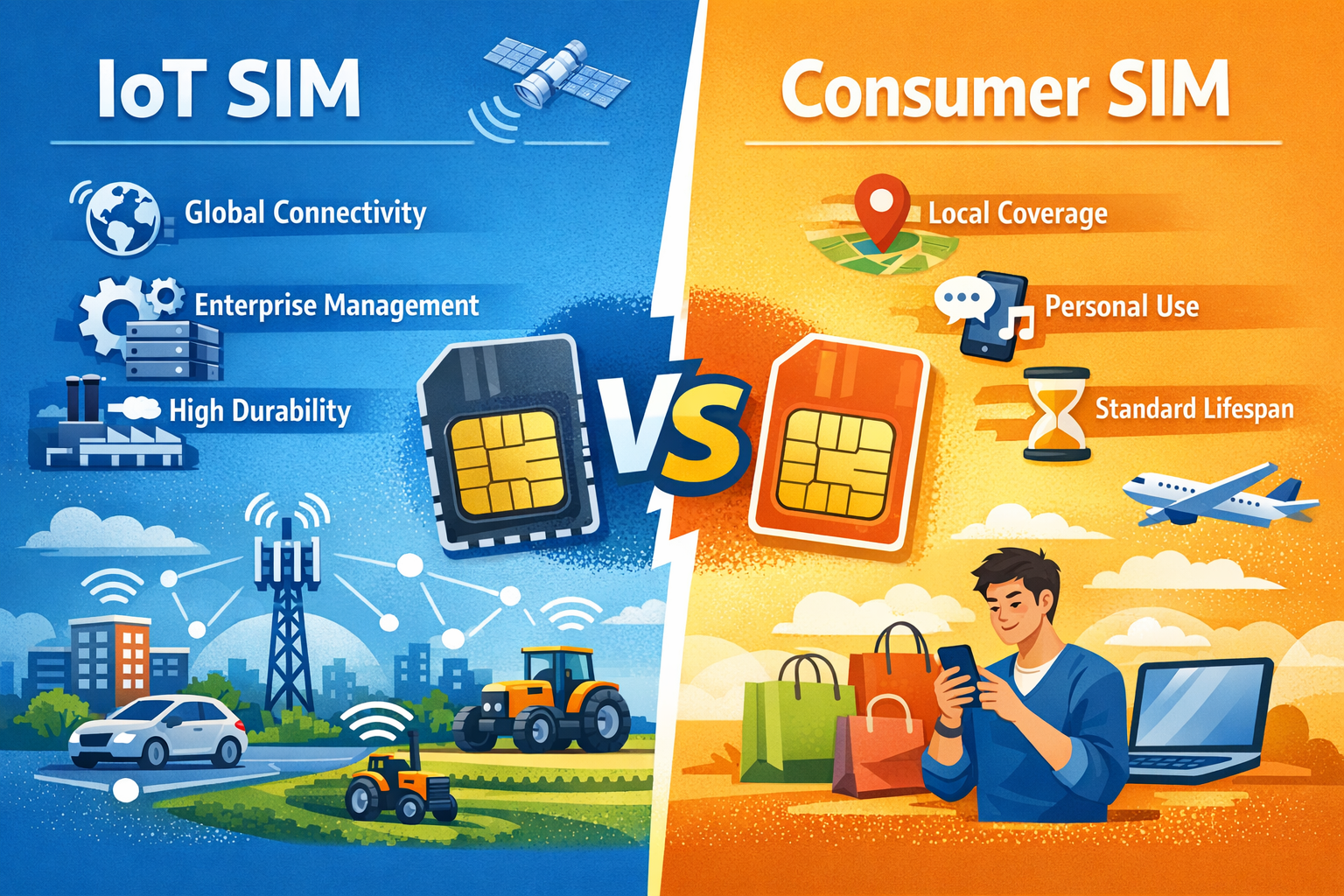1. Introduction: The Evolution of Industrial Monitoring
In the era of Industry 4.0, data-driven decision-making has become the foundation of efficient and intelligent manufacturing. Industrial monitoring systems are now deeply integrated with the Internet of Things (IoT), enabling real-time visibility, remote control, and predictive maintenance of factory equipment.
At the core of this digital transformation lies one critical component — the IoT SIM card. It connects industrial devices to centralized platforms over secure, reliable cellular networks, enabling seamless data transmission even in remote or harsh environments.
2. What Is an IoT SIM Card?
An IoT SIM card is a specialized SIM designed for machine-to-machine (M2M) and IoT communication. Unlike consumer SIM cards used in smartphones, IoT SIM cards are built for industrial-grade use. They offer:
- Wide coverage across multiple networks and countries
- Remote management through online platforms (activation, suspension, data tracking)
- Enhanced security features like private APNs, VPNs, and IMEI locking
- Durability under extreme temperature, vibration, and humidity conditions
This makes them ideal for applications such as factory automation, machine monitoring, remote diagnostics, and predictive maintenance.
3. The Role of IoT SIM Cards in Industrial Monitoring
Industrial environments depend on constant data flow from sensors, machines, and controllers. IoT SIM cards serve as the communication bridge between these devices and cloud systems.
Key functions include:
- Real-Time Data Transmission
IoT SIM cards enable continuous data transfer from sensors and PLCs (Programmable Logic Controllers) to cloud platforms, allowing managers to monitor temperature, vibration, energy usage, and equipment status in real time. - Remote Access and Control
Engineers can remotely manage machinery using IoT-enabled dashboards. If a system fault occurs, alerts are sent instantly, and remote adjustments can be made without visiting the factory floor. - Predictive Maintenance
IoT SIMs help collect operational data for AI analytics. By identifying early signs of equipment failure, companies can schedule maintenance before breakdowns occur, reducing downtime. - Multi-Network Reliability
With multi-operator connectivity, IoT SIMs ensure stable connections even in areas where one network is weak — critical for industrial zones located outside urban areas.
4. Common Industrial Monitoring Scenarios Using IoT SIM Cards
Let’s explore how IoT SIM cards are applied across various industrial monitoring use cases:
a. Factory Equipment Monitoring
IoT-enabled machines can send operational data (e.g., pressure, speed, load) to a central server. If anomalies appear, the system can automatically stop a line or alert maintenance teams.
b. Power and Energy Monitoring
IoT SIM cards are used in smart meters, transformers, and energy panels to transmit power usage data securely. This supports efficient energy distribution and early detection of overloads.
c. Environmental Monitoring
Industrial sites often monitor air quality, emissions, temperature, and humidity. IoT SIMs allow sensors to communicate over cellular networks — even in remote or underground facilities.
d. Logistics and Asset Tracking
Factory materials, vehicles, and containers can be tracked using IoT SIM-powered GPS modules, ensuring transparent, efficient supply chain management.
5. Advantages of IoT SIM Cards for Industrial Use
| Feature | Benefit for Industrial Monitoring |
|---|---|
| Multi-operator coverage | Always-on connectivity, no dead zones |
| Remote SIM management | Activate, suspend, or monitor usage from the cloud |
| High data reliability | Stable transmission for continuous monitoring |
| Private APN / VPN | Secured data flow between devices and servers |
| Rugged design | Operates in harsh industrial environments |
| Flexible data plans | Pay only for the data you use — scalable for different site sizes |
6. Choosing the Right IoT SIM Card for Industrial Monitoring
When selecting an IoT SIM provider for industrial monitoring, consider the following:
- Coverage: Ensure global or regional multi-network access.
- Platform Management: Look for providers offering online SIM management platforms.
- Security: Check for encryption, private APNs, and IP whitelisting options.
- Scalability: Verify support for large-scale device deployments.
- Support: Choose providers with 24/7 technical support and fast troubleshooting response.
Recommended Tip:
For industrial IoT deployments across multiple countries, multi-IMSI IoT SIM cards are ideal. They automatically switch to the best available local network, ensuring continuous operation.
7. Case Study: Factory Equipment Monitoring with Global IoT SIM
A manufacturing company in Asia implemented IoT SIM cards to monitor 1,000 CNC machines across five factories.
Results after 6 months:
- Downtime reduced by 22%
- Maintenance costs dropped by 15%
- Remote monitoring eliminated the need for constant on-site inspections
This demonstrates the scalability and economic benefits of using IoT SIMs for industrial monitoring.
8. Future Trends in Industrial IoT Connectivity
The future of industrial monitoring will rely heavily on next-generation IoT connectivity, including:
- 5G IoT SIMs with ultra-low latency
- eSIM and iSIM integration for remote provisioning
- Edge computing for local analytics
- AI-driven predictive maintenance for zero-downtime operations
IoT SIM cards will continue to evolve, offering even greater flexibility and intelligence to industrial applications.
9. Conclusion
IoT SIM cards are the backbone of modern industrial monitoring systems. They enable continuous communication between machines and cloud platforms, supporting predictive maintenance, real-time control, and operational efficiency.
For manufacturers aiming to achieve full digital transformation, adopting a reliable IoT SIM card solution is a vital first step.
10. CTA (Call to Action)
Looking for a global IoT SIM solution for your industrial monitoring system?
👉 Contact Zhongyi IoT — a trusted provider of IoT SIM cards with global coverage, private APN support, and flexible data plans for industrial clients.
Let your factory go smarter, safer, and more connected — powered by Zhongyi IoT.



